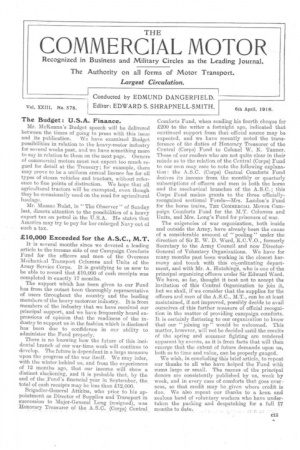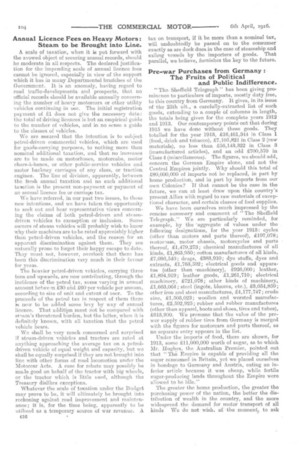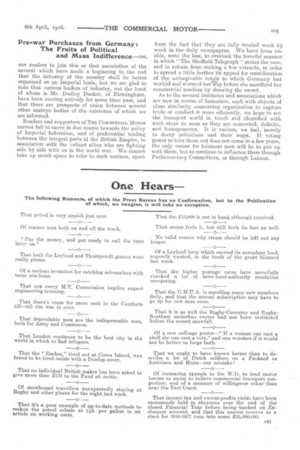The Budget : U.S.A. Finance.
Page 1

Page 2

Page 3

If you've noticed an error in this article please click here to report it so we can fix it.
Mr. McKenna's Budget speech will be delivered between the times of going to press with this issue and its publication. We have examined Budget possibilities in relation to the heavy-motor industry for several weeks past, and we have something more to say in relation to them on the next page. Owners of commercial motors must not expect too much regard for detail at the Treasury; for example, there may prove to be a uniform annual licence fee for all types of steam vehicles and tractors, without reference to fine points of distinction. We hope that all agricultural tractors will be exempted, even though they be occasionally used on the road for agricultural haulage.
Mr. Massac Buist, in "The Observer" of Sunday last, directs attention to the possibilities of a heavy export tax on petrol in the U.S.A. He states that America may try to pay for her enlarged Navy out of such a tax.
Z10,000 Exceeded for the A.S.C.,
It is several months since we devoted a leading article to the income side of our Campaign Comforts Fund for the officers and men of the Overseas MeChanieal Transport Cclumns and Units of the Army Service Corps. It is gratifying to us now to be able to record that £10,000 of cash receipts was completed in exactly 17 months.
The support which has been given to our Fund has from the outset been thoroughly representative of users throughout the country and the leading members of the heavy motorcar industry. It is from members of the industry that we have received our Principal support, and we have frequently heard expressions of opinion that the readiness of the industry to support us in the fashion which is disclosed has been due to confidence in our ability to administer the Fund properly.
There is no knowing how the future of this incidental branch of our war-time work will continue to develop. The future is dependent in a large measure upon the progress of the war itself. We may infer, with the winter behind us, and from the experiences of 12 months ago, that our income will show a distinct slackening, and it is probable that, by the end of the Fund's financial year in September, the total of cash receipts may be less than £12,000.
Brigadier-General Attkins, who prior to his appointment as Director of Supplies and Transport in succession to Major-General Long (resigned), was Honorary Treasurer of the A.S.C. (Corps) Central Comforts Fund, when sending his fourth cheque for 200 to the writer a fortnight ago, indicated that continued support from that official source may be expected, and we have recently noted the transference of the duties of Honorary Treasurer of the Central (Corps) Fund to Colonel W. N. Tanner. Those of our readers who are not quite clear in their minds as to the relation of the Central (Corps) Fund to our ow n may care to note the following explanation: the A.S.C. (Corps) Central Comforts Fund derives its income from the monthly or quarterly subscriptions of officers and men in both the horse and the mechanical branches of the A.S.C.; this Corps Fund makes grants to the three officiallyrecognized sectional Funds—Mrs. Landon's Fund for the horse trains, THE COMMERCIAL MOTOR Campaign Comforts Fund for the M.T. Columns and Units, and Mrs. Long's Fund for prisoners of war.
The exigencies of war organization, both inside and outside the Army, have already been the cause of a considerable amount of " pooling " under the direction of Sir E. W. D. Ward, K.C.V.O., formerly Secretary to the Army Council and now DirectorGeneral of Voluntary Organizations. We have for many months past been working in the closest harmony and touch with this coordinating department, and with Mr. A. Hutchings, who is one of the principal organizing officers under Sir Edward Ward. We have, so far, thought it best not to accept the invitation of this Central Organization to join it, but we shall, if we consider that the supplies for the officers and men of the A.S.C., M.T., can be at least maintained, if not improved, possibly decide to avail ourselves of this further measure of official recognition in the matter of providing campaign comforts. It is certainly flattering to our organization to know that our "joining up" would be welcomed. This matter, however, will not be decided until the results of the spring and summer fighting are rendered apparent by events, as it is from facts that will then emerge that the extent of future demands upon us, both as to time and value, can be properly gauged.
We wish, in concluding this brief article, to repeat our thanks to all who have helped the Fund with sums large or small. The names of the principal donors are consistently published by us, week by week, and in every case of comforts that goes over seas, so that credit may be given where credit is due. We also repeat our thanks to a keen and zealous band of voluntary workers who have undertaken the packing and despatching for a full 17 months to date._
Annual Licence Fees on Heavy Motors: Steam to be Brought into Line.
A scale of taxation, when it is put forward with the avowed object of securing annual records, should be moderate in all respects. The declared justification for the impending scale of annual licence fees cannot be ignored, especially in view of the support which it has in many Departmental branches of the Government. It is an anomaly, having regard to road traffic-developments and prospects, that no official records should be available annually concerning the number of heavy motorcars or other utility vehicles continuing in use. The initial registration payment of £1 does not give the necessary data : the total of driving licences is but an empirical guide to the number of vehicles, and in nb sense a guide to the classes of vehicles.
We are assured that the intention is to subject petrol-driven commercial vehicles, which are used for goods-carrying purposes, to nothing more than nominal additional taxation, and that no increases are to be made on motorbuses, motorcabs, motor ehars-b-bancs, or other public-service vehicles and. motor hackney carriages of any class, or traction engines. The line of division, apparently, between the fresh annual taxation and no such additional tamation is the present non-payment or payment of an annual licence fee or carriape tax.
We have referred, in our past two issues, to these new intentions, and we have taken the opportunity to seek out and hear representative views concerning the claims of both petrol-driven and steamdriven vehicles to exemption or inclusion. Some owners of steam vehicles will probably wish to know why their machines are to be rated appreciably higher than petrol-driven vehicles, and the reason for an apparent discrimination against them. they are naturally prone to forget their happy escape to date. They must not, however, overlook that there has been this discrimination very much in their favour for yeas.
The heavier petrol-driven vehicles, carrying three tons and upwards, are now contributing, through the incidence of the petrol tax, sums varying in annual amount between 130 and. £60 per vehicle per annum, according to size of unit and extent of user. To the proceeds of the petrol tax in respect of them there is now to be added some levy by way of annual licence. That addition must not be compared with steam's threatened burden, but the latter, when it is definitely known, with all taxation that the petrol vehicle bears.
We shall be very much concerned and. surprised if steam-driven vehicles and tractors are rated at anything approaching the average tax on a petroldriven vehicle of equal weight and capacity, but we shall be equally surprised if they are not brought into line with other forms of road locomotion under the Motorcar Acts. A case for rebate may possibly be made good on behalf of the tractor with big wheels, or the tractor which is little used, although the Treasury dislikes exceptions.
Whatever the scale of tasaation under the Budget may prove to be, it will ultimately be brought into reckoning against road improvement and maintenance; it is, for the time being, apparently to be utilized as a temporary source of war revenue. A 016 tax on transport, if it be more than a nominal tax, will undoubtedly be passed on to the consumer exactly as are dock dues in the case of steamship and sailing vessels by the importers of goods. That parallel, we believe, furnishes the key to th.e future.
Pre-war Purchases from Germany : The Fruits of Political and Public Indifference.
"The. Sheffield Telegraph" has been giving prominence to particulars of imports, mostly duty free, to this country from Germany. It gives, in its issue of the 25th ult., a carefully-extracted list of such goods, extending to a couple of columns in length, the totals being given for the complete years 1912 and 1913. Our contemporary points out that during 1915 we have done without these goods. They totalled for the year 1913, £16,461,344 in Class I (food, drink and tobacco), /7,105,821 in Class 2 (raw materials), no less than 156,143,322 in Class 3 (manufactured articles), and an odd 1700,570 in Class 4 (miscellaneous). The figures, we should add, concern the German Empire alone, and not the Central Empires jointly. Why should this total of 180,000,000 of imports not be replaced, in part by home production, and in part by imports from our own Colonies? If that cannot be the case in the future, we can at least draw upon this country's present Allies with regard to raw materials of exceptional character, and certain classes of food supplies.
We have been ourselves much impressed by the concise summary and comment of "The Sheffield Telegraph." We are particularly reminded, for example, by the 'aggregate of values under the following designations, for the year 1913: cycles (other than motors and parts thereof), £197,078; motoreaas, motor chassis, motorcycles and parts thereof, £1,479,273; chemical manufactures of all kinds, 11,863,950; cotton manufactures of all kinds, £7,096,540; drugs, 1383,910; dye stuffs, dyes and extracts, 11,763,502; electrical goods and apparatus (other than -machinery), £026,000; leather, £1,894,919; leather goods, £1,261,710; electrical machinery, £721,078; other kinds of machinery, £1,663,064; steel (ingots, blooms, etc.), £3,054,859; other iron and steel manufactures, 14,177,747; crude zinc, £1,503,023; woollen and worsted manufactures, £2,592,925; rubber and rubber manufactures (other than apparel, boots and shoes, tires and tubes), 1613,900. We presume that the value of the prewar supply of rubber tires from Germany is merged with the figures for motorcars and parts thereof, as no separate entry appears in the list.
Under the imports of food, there are shown, for 1013, some /11,000,000 worth of sugar, as to which Mr. Hughes, the Australian Premier, pointed out that " The Empire is capable of providing all the sugar censumed in Britain, yet we placed ourselves in bondage to Germany and Austria, eating an inferior article because it was cheap, while fertile sugar-producing lands throughout the Empire were allowed to be idle."
The greater the home production, the greater the purchasing power of the nation, the better the distribution of wealth in the country, and the more widespread the demand for motor transport of all kinds We do not wish, at the moment, to ask
Pre-war Purchases from Germany : The Fruits of Political and Mass Indifference—con,
our readers to join this or that association of the several which have made a beginning to the end that the industry of the country shall be better organized on an Imperial basis, but we are glad to note that various leaders of industry, not the least of whom is Mr. Dudley Docker, of Birmingham, have been moving actively for some time past, and that there are prospects of union between several other embryo bodies of the existence of which we are informed.
Readers and supporters of THE COMMERCIAL MOTOR cannot fail to move in due course towards the policy of Imperial federation, and of preferential trading between the integral parts of the British Empire, in association with the \ aliant allies Who are fighting side by side with us in the world war. We cannot take up much space to refer to such matters, apart from the fact that they are fully treated week by week in the daily newspapers. We have been unable, none the less, to overlook the forceful manner in which " The _Sheffield Telegraph " states the case, and to refrain from making a few extracts, in order to spread a little further its appeal for consideration of the unforgivable totals to which Germany had worked and wormed her7vay before she sacrificed her commercial position by drawing the sword.
As to the several institutes and associations which are now in course of formation, each with objects of close similarity concerning organization to capture trade or conduct it more efficiently, We hope to see the transport world in touch and identified with such steps as soon as they are concerted, definite, and homogeneous. It is useless, we feel, 'merely to decry politicians and their ways. If voting power to turn them out does not come in a few years, the only course for business men will be to put up with them, but to continue to influence them through Parliamentary Committees, or through Labour.






















